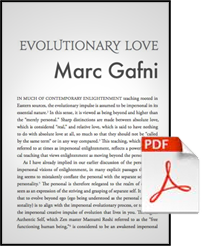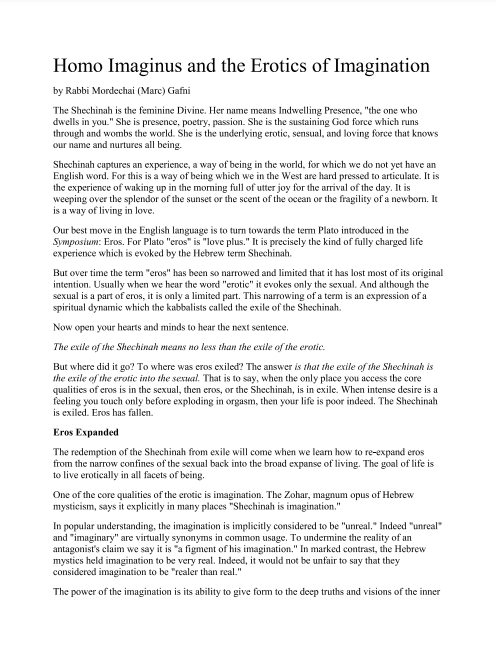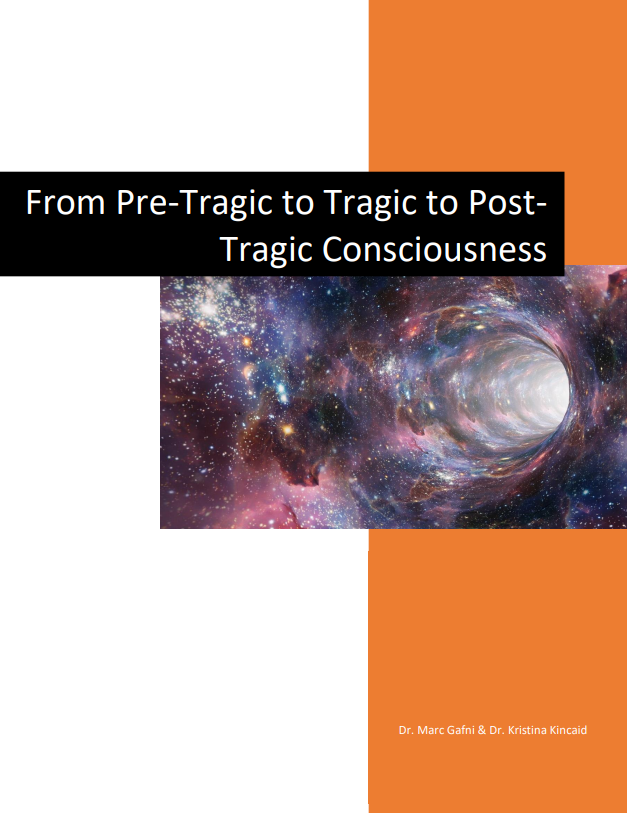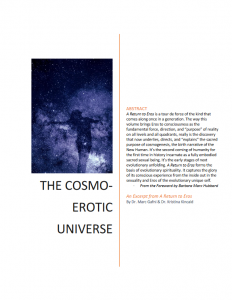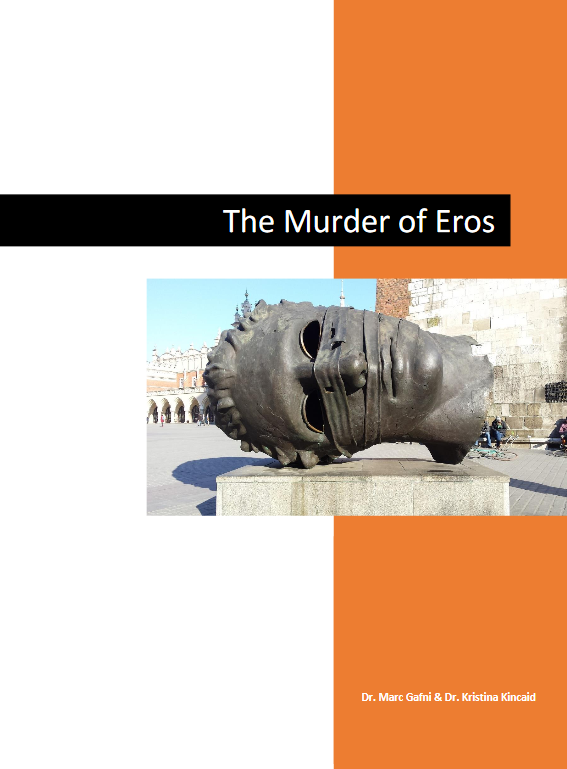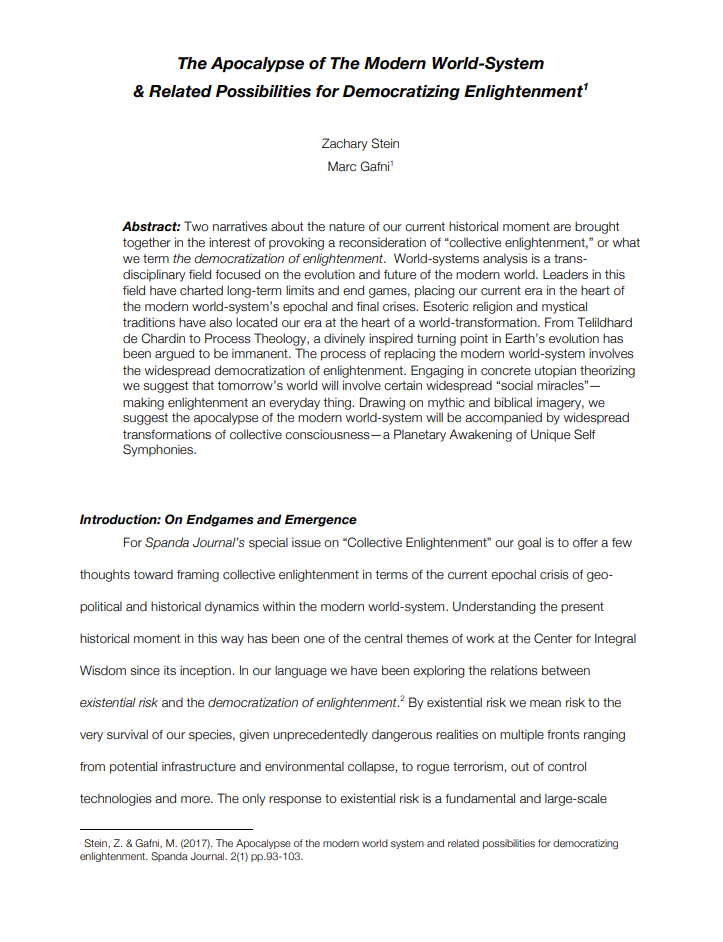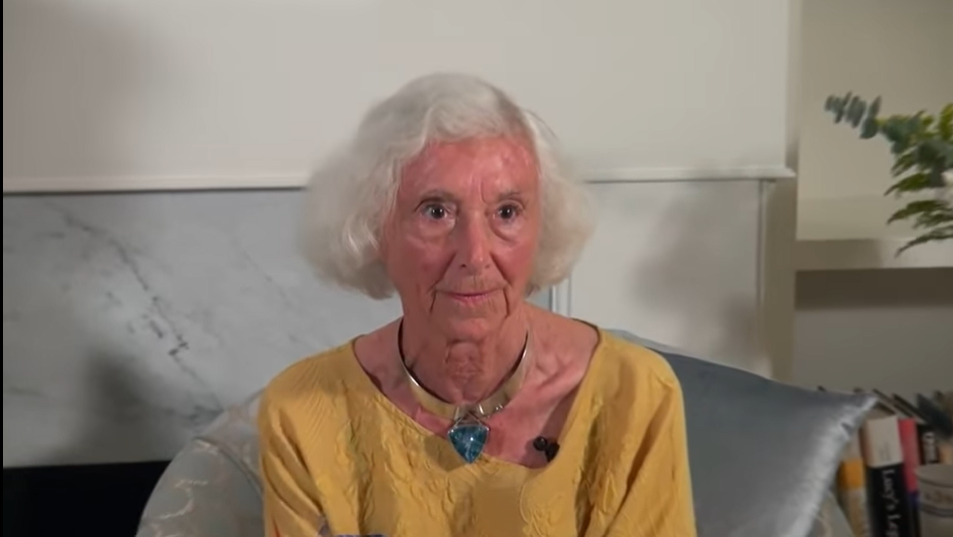Exploring the Paradox and the Problem of Evil and Outrageous Pain – Marc Gafni and Ken Wilber in Dialogue after the Success 3.0 Summit
How do we live in a world of Outrageous Pain?
In this conversation Dr. Marc Gafni and Ken Wilber explore the paradox and the problem of evil and Outrageous Pain. They talk about the problem of suffering and the problem of evil in the world.
Transcript
Exploring the Paradox and the Problem of Evil and Outrageous Pain
Marc We’re going to talk about the problem of suffering and the problem of evil in the world. How do we live in a world of outrageous pain? From that place we going to kind of end and take questions on what we talked about, if there is something pressing or something else and we’ll each answer the question. So, you will be able to hear the play and the answer while we continue our usual dialogue through your questions. I talked about Ken very little before, just kind of understated.
I am going to say just one thing, Ken has two things going for him, the second one is much bigger than the first. I’m insanely right mind, that’s awesome. He’s kind of pended integrator, actually standing and integrating and weaving in a way that’s virtually unparalleled in the generation. It’s a stunning integration that’s actually tipping the source code of what is possible and I made a decision to locate myself here and I wouldn’t have started the think tank with anyone in the entire world, not any other candidate other than Ken. There were two people in the running, there was only one. There was only one person possible to do this thing with, in this culture, in this moment. That is actually his second-best attribute.
His first is, he’s a wild outrageous lover in the deepest essence of who he is. Everything he is about outrageous love, the entire integral project is about weaving creating the force of attraction which everyone and everything has a place at the table. Everyone is included, nothing is excluded to weave a possibility of a world of outrageous love. From that place and in that place, we live in a world of outrageous pain.
Ken Yes, absolutely.
Marc So take us in, take us in. Those shoes, by the way, are fucking awesome. Just saying. Let’s just start and we began this conversation. What do we do with the problem of pain? You don’t address it a lot in your books, a couple places here and there. Like, 8 years ago, at the spiritual center, I think it was Patrick Sweeney that asked us a question when we had that exchange. So, you start off. How do you enter that and the I’ll take it from there?
Ken One of the things that you start to notice about pain and suffering is that it seems very much to be connected with the type of self-identity that you draw. One simple way of putting it is that the more things that appear outside of you that feel other to you are ones that can afflict pain. The Upanishads say for example wherever there is other, there is fear. A very interesting notion that as soon as we recognize something outside or separate from us, then that then can hurt us. The more we recognize it, our identity envelopes that, includes that, then the less that thing can come across as pain.
Until, when we get to the supreme identity, an identity with everything arising moment to moment. This is traditionally defined as no pain or no suffering. There’s an idea of tradition, enlightenment, awakening, Moksha, freedom, the great liberation, the supreme identity is defined as a dropping away of suffering. That doesn’t mean pain is gone. You can still experience pain, but because you are identified with it because it is not something outside of you, because it is not something you are fighting or contracting against, it doesn’t cause suffering.
So, pain plus the self-contraction is suffering. As you get rid of the self-contraction, you can get rid of suffering and then pain is just an interesting, energetic sort of vibration, but it is not something that is threatening you, because it is no longer outside of you. So, when you get into states of enlightenment, states of non-dual unity, consciousness, then there is literally nothing outside of you, nothing feels like it’s outside of you. You get this deep feeling that everything that is arising is the texture of yourself. That all of this is what you are.
So, even right now, you’re not, if you actually sort of watch how your awareness can shift, the standard idea would be that you are in this room. Everybody kind of agree with that. But if you stand back a bit, let your awareness relax and unfold, you start to recognize that actually this room is arising in your awareness. You are actually embracing this room. This room is something that is in you and the same as you go out and you can look at the environment out there, you can look at the mountains, you can look at the clouds going through the sky and the clouds are something that is arising in your awareness. The clouds are in you.
So, as you continue in that fashion, you can get yourself into a state where the entire universe is arising within your fundamental awareness. Within your own being. In that situation, there is nothing outside of you and because of that there’s nothing you fundamentally can desire because there’s the thing outside that can be desired and in the same way there is nothing that can threaten you. There is nothing that can frighten you. There’s nothing that can harm you because there is nothing outside of you.
Marc Usually at this point of the conversation, I would say something like you’re always the most brilliant explainer of Buddhism, better than Buddhism itself. What the fuck, man? Here’s where we would go back and forth and kind of feel it, of course. You are approaching it, again, you always just restate it better than its stated the first time. The response to outrageous pain is actually shifting your own identity in a core way.
Ken Sure.
Marc For example, there’s a great non-dual master that you and I have talked about when we talked to Moshe Idel back in the day by the name of Levi Isaac of Berdichev who’s the greatest non-dual master ever. Super cool dude. I mean, he didn’t dress nearly as well as you, but he was like super, super cool. And his like Levi Isaac, and Idel calls him the greatest non-dual master of the 19th century. When he responds to outrageous pain, he actually did in Berdichev is, he held a trial where he put God or reality on trial. He actually called witnesses from all the surrounding towns, you know, orphaned widows, people who were destitute and this great non-dual master, who was a kind of Gupte figure in terms of his writing, in terms of his depth, puts God on trial.
The trial lasted a couple of weeks and then since he was the local Rabbi, he was the arbiter, he found God guilty. His response was protest, which is a different response in a lineage tradition and of course three faces of God, that you articulated so gorgeously, not in conflict but just kind of play with that other way of doing it where you protest but not from a place of contraction, I think that is how people read it.
It is not just a Separate Self protesting, but if you put the kind of classical Kabbalistic and Buddhist position together, I shift my prospective because I am one with the Divine but then that oneness with the Divinity, that lives within me, then shouts out and says, “It’s not fair!” It shouts out and says, “It can’t be this way!” and it shouldn’t be this way and by developing a kind of spirituality of protest, I am actually able to respond to outrageous pain. This is a different way to play. How does that play with you?
Ken Say more about how you play with it under different circumstances.
Marc When I am experiencing outrageous pain, I need to affirm the dignity of my life and I can only do that by actually saying that this is not fair. It’s not that I just have to shift my identity, which of course, I do, yes. But actually, it’s like prayer forms the dignity of personal need. Protest affirms the dignity of the human situation. The human situation is such that we are storied beings and although there is an egoic story we need to move beyond. There’s the Unique Self story that we have to live in and when that story is violated, it’s a violation.
We would rather hold the mystery of the violation and protest, but not from our Separate Self, paradoxically, but as Divinity, I am now crying out God’s protesting God through me. Which allows for the possibility of existential dignity of which I am always troubled, not just in Buddhism, Kabbalism, as we’ve talked about several times, has similar positions. I am always troubled by that, what Scholem used to call the anti-existential position. I know Yadah kind of talks about that also. How does that play with you?
Ken Well, fine.
Marc Fine, right?
Ken Yeah.
Marc They live together.
Ken Huh?
Marc They live together.
Ken Yeah, basically and they strike me as essentially two different perspectives on the same fundamental situation. The situation we are talking about is this outrageous, weird, completely crazy situation of the relationship between the human and the Divine. They are in so many ways deeply interwoven, they deeply need each other, they have, on the one hand, just looking at the face of it, they have different, if you will, perspectives, different views. The thing that makes the human condition such an extraordinarily wild condition, at the very least the intersection of these two…
Marc The ultimate paradox.
Ken It is.
Marc The ultimate, ultimate paradox.
Ken Completely.
Marc You can only laugh.
Ken Completely. Somebody said a paradox is truth standing on it’s head trying to get attention.
Marc Nice.
Ken it’s not just that they are contradictory, although they can appear that way, but the contradictions where both of them are known to be true.
Marc Right. No, that’s great.
Ken So, that’s very different.
Marc Paradox is the core of the whole thing.
Ken Paradox is the core of the whole thing. Paradox is the direct key to this relationship.
Marc Aren’t they parenthesis? I’d say if one thing marks integral it’s the ability to hold paradox.
Ken There are so many different aspects about that, but paradox is core.
Marc Let’s come back to paradox afterwards.
Ken Also it’s tied up with the opposites. So, what we have in the manifest world, is a world of opposites and so, you have virtually no concept makes any sense unless it’s contrasted with its opposites. Infinite doesn’t make sense with finite and pleasure doesn’t make sense without pain and inside and outside etcetera. Almost any concept we use has meaning only in terms of it’s opposite. One of the things that of course humans want to try to do is when they describe their situation, they want to describe it with a set of concepts or a set of ideas that they think captures essential truths, but right there we are stuck with a paradox because the very concepts that you use to describe what you think are true, only makes sense in terms of their opposites.
You can never get rid of those opposites and the sense that’s what a lot of the non-dual theorists say is that here’s why alternate spirit is non-conceptual, or why you can’t approach it in theoretical terms or just conceptual in terms and that is that any concept that you use to try to approach spirit is going to make sense only in terms of it’s opposite. The spirit doesn’t have an opposite. It’s not just half of the world it’s the entirety.
Marc Abraham Cook has a beautiful thing he says, “The Holy has an opposite, the Holy of Holies has no opposite.”
Ken Exactly.
Marc It’s its very nature.
Ken Exactly.
Marc It can’t have an opposite. Let’s just go back to the human. Let’s look at the paradox we just played with here. So, you put this position to the space which is, and it’s gorgeous, you have shifted your own self-perception and when you shift that, pain doesn’t go away but suffering, that part goes away and then the other position, which is no, actually, you affirm the dignity of your suffering and you protest. Where now in the old world that would have caused a theological war. Oh my God, which one is true? What we’re saying now is no, actually those are two faces of reality and those two faces of reality emerge from, let me just unpack it for 2 minutes and pass it back to you.
If I basically experience reality from a kind of mystical perspective in which there is no other. You’ve got to move beyond the personal and kind of realize that the essential underlying oneness of everything move beyond Separate Self to True Self. As you always love to say quoting Schrödinger, “Single has no plural”. Then if you’re suffering move to True Self. That would be the move you make, but if you’re kind of Rumi, and you fall in the arms of the beloved, and the beloved just fucked you over, and if you can’t actually call the person that you are in love with on conflicting pain, then you have violated the relationship.
The only way to can restore it and it’s from that perspective, it’s not a theological problem, pain, it’s an intimacy problem. It’s a violation of intimacy. As Divinity becomes not just nothingness but the infinity of intimacy. Intimacy has been violated in the relationship through suffering you can only restore the relationship by restoring intimacy. You restore intimacy by getting angry and having the dignity of your anger affirmed. We don’t need to fight because actually those are two perspectives that live in paradox, what you would call the first and second person of God and you get to actually be in both of them.
Ken Well, that’s the thing.
Marc That’s stunning.
Ken Exactly. Part of what we are dealing with here, again, is the, the eye of flash, the eye of mind and eye of contemplation. Each of these are three different types of knowing, at a minimum, that human beings have access to. One of the problems that we have is that we’re always trying to make one eye…
Marc Thé eye.
Ken Thé eye, and one eye have all of the answers and it just doesn’t.
Marc I should tell our friends, by the way, this is e-y-e, eye.
Ken E-y-e, eye. So, all of it’s connected to the I, capital I. If you look at science, for example, it bases its truths ultimately on, at least orthodox science, on the types of truths that it can find using censoring data. Censoring data or its extensions, telescopes, microscopes, X-ray machines, and so on. That’s the kind of truths that science gives us, basically.
Then you also have the eye of mind and the eye of mind can give these truths that the eye of flesh can’t. With the eye of mind, you have things like logic or mathematics or interpretation and when it comes to something like mathematics, nobody has ever seen the square root of negative one running around out there in the sensory world. Yet all of science, the eye of flesh, depends on logic and mathematic.
There’s a higher realm of truth that we have access to and then when we finally get to the eye of spirit, and again each of these eyes transcends includes its predecessor, by the time we get to the eye of contemplation then you starting to get into states of consciousness that have no other. Again, those in those states sometimes called unity, consciousness or non-dual awareness, but that’s where it gets tricky, that’s where it gets paradoxical because we have ultimately a reality that is all embracing, all encompassing and yet we have all of these differentiations and all of these paradoxes all of these contradictions in the relative realm that we really can’t solve in that realm.
So, we have to move to eye of contemplation to actually get answers to these ultimate questions but those answers themselves aren’t something that can be put into words nor can they give us nice answers in a philosophical system. If nothing else, they going to plug us in to this ultimate radical, all inclusive reality and we’re simply going to, if you will, vibrate with the truths of an all-encompassing reality. That’s itself is the answer to any questions that we would have. Who am I? Where I come from? What’s ultimately real? Though there are answers to those questions, not from the eye of flesh and not from the eye of mind, but from the eye of contemplation, from the eye of spirit.
Marc So, let me just kind of check you. Let’s jump into the eye of spirit. I have a contemplation. I just kind of want to throw a suggestion into the space and we’ve pushed back and forth on this over the years. Sometimes the non-dual teaching is presented it actually loses paradoxical nature. That is to say paradoxes’ thought to exist in the manifest world. When we actually get to oneness, there is no paradox, we’re just paradoxically non-paradoxical. Meaning, that I can be a master of total oneness, total non-dual unity and there is still other and the other is the personal face of essence that knows my name.
Now, in Kashmir Shaivism, for example, they refuse to ultimately hold the paradox because as you know the tat was the highest levels, there’s just the one. In Kabbalah they hold the paradox. There paradox is different than in Kashmir Shaivism, that actually you’re in the complete oneness, there is no paradox at all and there’s other and who’s the other? Divinity, that’s you, that’s also holding you at the very same time. That is this wild paradoxical move and without that paradoxical move, oneness, so, in some sense, there is one taste but the paradox is there is two tastes. The two tastes exist even in the highest oneness.
I remember in those months before kind of the three eyes, the three faces of God got formulated. God in the first person, thou art that, non-dual. God in the second person, I thou, and God in the third person, the energy of the Kosmos, third person. I remember we talked about Levi Isaac, bridges of the story, the same master who would make a blessing and he would say [Hebrew], blessed are you. He would go “Blessed are you, you, you, you!” People would faint in ecstasy because the “you” was so real that he realized that the “you” wasn’t a concept, the “you” was a realization. The actual realization of the eye of contemplation.
Ken Right.
Marc Without contemplation, paradoxically, and there’s where it becomes a great, beautiful, integral ability to hold total oneness so that the question is removed because there is no question, and then the other side is, the answer to the question is the question itself. Let me just go one more second on that and then back to you. So, if I question why is this happening?
I can either remove the question by saying I shift my identity, I am part of the one or I can say in the question itself, where I challenge Divinity, I challenge reality in that question is the answer because the question affirms the goodness, because I can’t challenge goodness if there’s no goodness and it affirms relationships because who an I asking the question to? By questioning itself, I am affirming the relationship, I am affirming that we love each other.
If you hear my anger and we’re angry at each other, the dignity of my anger restores our relationship. I kind of feel like in modernity, when we give an answer to suffering that is only the Ramana Maharshi answer. Without the Kabbalistic answer, we lose something. We need to hold…
Ken That’s the thing.
Marc That’s an integral move.
Ken Well, both of those are one way of looking at it.
Marc Right.
Ken And that’s the ultimate, really the sort of paradox of paradox of paradox. Which is that just by saying it’s a paradox that doesn’t like to sneak in a non-paradoxical answer. Under that paradox is another paradox. I mean, it’s the radically, infinitely of unbelievably, unendingly paradoxical nature of how human beings can see reality.
Marc And this is not theoretical that you are talking about.
Ken No.
Marc This is how I live in the world.
Ken Absolutely.
Marc There is nothing theoretical about this conversation at all. Am I able to live and hold the paradox or am I not? And that affects my ethics, it effects my sexuality, it effects the way I do business, it affects how I show up in every moment in the world. Am I holding paradox or am I not?
Ken Exactly. There’s, in a sense, a deeper paradox where both of those are held.Marc Are held.
Ken So, that’s what stops either one or the other from being the final answer.
Marc Paradox is all the way up and all the way down.
Ken All the way up, all the way down, all the way in, all the way out, all the way left, all the way right. Because of this peculiar situation, where we have a single universe, if you will, a single spirit, if you will, but it is manifesting. So that means simultaneously infinite spirit is remaining itself, fully. It is also going out of itself, fully. So, it’s both remaining itself and losing itself.
Marc It’s losing itself.
Ken Right there you have a formula for a universe that is always going to be doing that when you are trying to get to the ultimate answers. It’s always going to be fully in itself and fully out of itself. Fully paradoxical and paradoxical about paradoxical. Endlessly, because any time you stop that, then you fix on just a single monolithic answer and that’s the one thing it isn’t, is it isn’t that.
Marc Totally, which is why the traditions lost uniqueness. Uniqueness seemed to be if you moved beyond your Separate Self and your part of the one, how can you also be unique? I remember 10 years ago, when we started talking about it, everyone said that’s completely crazy. You become no self because you can’t be unique if your part of the one. That’s kind of obvious. The answer is of course not. Actually, paradoxically, I can move beyond my separateness, I can be completely part of the one and yet utterly and irreducibly unique in the very same moment. Without that realization and in that sense, I would say that the great traditions, none in there most esoteric form, in their most taught form, were actually guilty of refusing to hold paradox because paradox is hard to hold.
Ken Exactly. Again, there’s, behind all of that, is paradox is the truth standing on its head to attract attention. That’s mere a contradiction which is truths that disagree with each other and just disagree with each other, this jam. Paradoxes are two truths, disagree with each other but we know both of them are right. We know that both of them are true.
Marc Exactly, both of them are true.
Ken That’s where it gets interesting. That’s where you are getting very close to the Holy of the Holies.
Marc Let’s just maybe go one more step and I think there’s some other people in the line, so we will let them ask some questions. There are still some people in the line. Let’s try to go one more step back and forth. The only way I can show myself or people paradoxes is by pointing it out. Not something like a pointing out instruction, you point it out. Is there anybody in this room who’s married?
How’s it going? Who’s married? Are you married? What’s your name? […] Gavi, I knew that, okay. So, Gabi is your husband around someplace? Where is he? […] Raj, okay, so let me just ask you a question. This is kind of paradoxical. When you married Raj, did you have a choice? There was basically no one else for you to marry. He was like the last guy around. [Can’t hear answer 31:40] Was it free, what is a free choice that you made or was it utterly determined? Which one? Was it free or just obviously determined? […] So, how can that be? Both is one of my favorite words.
I obviously chose Raj, right? I mean, obviously, right? […] And there is actually no one else in the world that can be my husband, other than Raj? Even though I heard a little about your past. You went out with a few other guys. We’re not going to mention any of them right now. So, Gabi is holding in her body paradox. She totally chose Raj, and yet there is no possibility that she ever could have married anyone else other than Raj. How could that be?
That is the paradox of freedom and determinism, you actually embody it. I looked at Gabi and I thought of Gabi and Raj like perfect paradox right there. It’s like clearly obvious. That’s pointing out. That’s the eye of the spirit.Ken Yeah. The whole point of the eye of the spirit is that whenever what its direct immediate realizations are. Whenever they are expressed in conceptual terms, they turn into paradox. These two opposites that are, both of them can’t be right, and yet we know that both of them are right.
Marc Just because it’s us and it’s our Monday call, if you had to pick in your life what is paradoxical, where would you go? Everything, right?
Ken Sure.
Marc Give me an example, just for fun. Just you and me, right?
Ken In terms of do I feel awakened or do I feel self-contracted, ignorant, caught in an illusion, sin, separation, and the tendency is to think, oh gosh, I am in the self-contracted state but I can get in a released, realized awakened state and right there that itself already that’s an incorrect move. I got it wrong, right?
Marc From the start. I am going to become enlightened.
Ken Exactly. The eye of the spirit in two completely separate realms and I am going to get out of one and I am going to get into other. Even if I did that, all that I would have is half of reality.
Marc Right and who would want that?
Ken That’s not going to be good. So, it’s going to have its own form of suffering. It’s suffering of incompleteness; it’s suffering of not really being all embracing. In that sense, deep, deep, deep paradox is the way that spiritual truth shows up in conceptual live mind.
Marc In your day-to-day experience, you kind of feel both always happening. Total freedom…
Ken Part of the trick, and it really is kind of tricky, is that if you look at the opposites the idea is that you really want to be able to get to a position where you can see that all of the opposites are true. You don’t want to end up trying to get just the good, just the pleasurable, just the positive and get rid of the negative and get rid of the evil and get rid of pain, etcetera. You don’t want to hold on to life and get rid of death because underlining both of those is whole reality and both of those, the negatives and positives, are just like if you are drawing a painting, you need both light and dark in order to draw this painting and right now we have this whole painting that’s arising in our awareness right now.
It’s a total painting of all that is. It’s a complete painting and so we consider that and we have essentially one of two possible approaches to it. One is we look at everything that is arising, everything we’re feeling, everything we’re seeing and we say okay, I like that, and I like that, and I like that, so I am going to try to hold on to there. I don’t like that, I don’t like that, I don’t like that, so I get this primordial avoidance of some aspect of the total painting, of all that is.
In that primordial avoidance, I am splitting reality and I splitting myself from it and I am delivering it up in fragmented pieces, which are broken, torn, partial, tortured, tormented and that’s going to convert pain into suffering. That’s the typical way that we do it. The other is through some of the more meditated or contemplative ways and that is to basically relax and allow everything in the total painting of all that is, to arise. Don’t look away from any of it, don’t turn away from any of it, don’t push away from any of it, but radically embrace everything that is arising moment to moment.
Marc I mean, there it is. Maybe just to pick up from that and to finish the last piece and then take questions. So, paradoxically, and here’s the position of the kind of evolutionary mystic, on the one hand it is all perfect, it’s ultimately all perfect and yet I’ve got a change everything at the same time. This notion of Tikkun and Kabbalah is that actually I am participating in liberating the sparks, there’s this kind of emanation of Divinity into, as it were, vessels of reality. Those vessels explode, they break, the shards of the vessels are scattered and then as the heroic human being, I liberate the sparks from the vessels and return them to their source.
That’s Tikkun, I am fixing reality. In that fixing, I am fixing a reality that’s perfect and here’s the wild thing, Abraham Cook, the mystic that we love so much, he says there is two kinds of perfection. He says it in a very simple and beautiful way. He says, “If you have two friends…”, he likes to [Word 39:20] all his spiritualizations, “You have two friends and one of them has got this perfect life. They’re awesome. They’ve always been perfect. Then you have another one who is imperfect but really struggled to perfect. Which one is more perfect? Obviously, the second one who is imperfect but struggling in order to perfect. How can it be then that Divinity can only be perfect?”
If we realize that it is actually more perfect to perfect yourself. Cook says, “Even Divinity itself is evolving. That actually Divinity is completely perfect, yet paradoxically evolving all the time.” [Hebrew 39:57] It’s just the ability to hold that that allows us to live in the world and to kind of, I just know it in my life, I am like ecstatically happy and I am filled with pain. Pretty much all the time and every second I am in complete ecstasy and I cry all the time and I laugh. It’s almost like we cry out of one side of our mouth and we laugh out of the other side of our mouth. To be able to hold that and not to refuse either of the sides, so we’re born in that.
Ken Well, that’s the only actual response to this extraordinarily, deeply ingrained, paradox of ultimate reality. As we strive to understand it through the eye of mind and through the eye of flesh, and so being able to hold on to both sides of those is the way that we stretch our awareness to be able to include the entire painting of all that is.
Everything that is arising is to be embraced in that sense and that’s a practice itself, that is itself an extraordinary action of putting your arms out and embracing everything that’s arising to acts of outrageous love and so on. What you are embracing are these dual aspects of paradox and even the paradox of the paradox and I mean, it is an infinite hall of reflecting mirrors.Marc It just literally changes everything.
Ken Yeah. The problem with so many approaches to theological systems and spiritual systems they try to nail it to just one.
Marc hey refuse to hold it, they refuse. Utter refusal of the whole paradox. Extremists feel better when they wake up in morning because they take one value, they decontextualize it from the larger constellation of values and they make it a whole.

